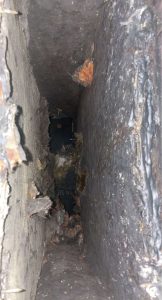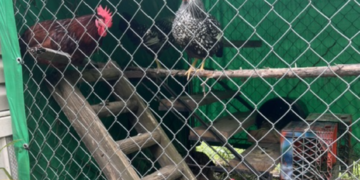Since 2018, Ole Miss students and parents alike have complained about the conditions in the university’s traditional dormitories. After many complaints about sickness due to mold growth in dormitory rooms, showers and bathrooms, the Department of Student Housing stated in their strategic plan that the university would facilitate mold and air quality testing each summer in Martin, Crosby and Stockard halls beginning in 2018.

The facility air quality reports that the university has conducted are located on the Student Housing website. The most recent air quality report available was conducted over 2 years ago in September 2019. University of Mississippi Public Relations states that the tests happen annually.
“Air and surface testing are conducted annually. The air and surface test results for 2021 revealed low air spore counts in rooms compared to outside air spore counts,” said UMPR.
In September 2019, John Yaun, Student Housing Director, denied the presence of mold in any campus residence halls in a letter sent to Crosby Hall residents. However, that same year, a student who lived in Crosby Hall conducted an at-home mold testing kit that proved the presence of Aspergillus niger, a fungus that can lead to black mold on fruits and vegetables.
Students who live in Crosby Hall, the largest dormitory on campus, report symptoms of illness similar to residents from years past, including respiratory infections, sore throats and more frequent illness than they experienced living in other dormitories.
Freshman Fiona Muldowney, an integrated marketing communications major, has experienced illness that she believes is caused by mold in her room in Crosby Hall. After she reported the issue to Student Housing, they took notice of the issue and came to clean the air vent in her room last semester. They denied the presence of mold in her room.
“They were super nice, but I felt like they were trying to convince me there was no way mold was in my dorm instead of just doing their job and looking,” Muldowney said. “I was clearly sick and scared, and it sort of felt like they were there to back up the university rather than to actually check for mold.”
Muldowney noted that her air vents were “extremely dirty and dusty” and that her air vents at home do not look like that. After her symptoms recently worsened, requiring a chest X-ray, Muldowney admitted that she was looking at options to move off campus to maintain her health.
Students in Martin Hall have reported the same symptoms of illness as those in Crosby Hall, including shortness of breath, coughing, chest pain and exhaustion. Freshman exercise science major Emma Cochran is a resident of Martin Hall who also believes her sickness is a result of poor air quality and mold in the residence halls.
“When I went to the doctor, he even said ‘Martin Sickness,’” Cochran said. “I mean, I laughed it off at first because everyone says it’s the ‘Martin flu.’ When I kept getting worse, it was just frustrating because I had been on so much medication for so long, constantly in urgent care and spending ridiculous amounts of money on medication that I wouldn’t need if they would just take care of us.”
After being prescribed several different prescriptions including steroids, antibiotics and an inhaler, Cochran’s conditions began to improve.
The university commented on the cleanliness upkeep for all the dormitories in a statement from public relations.
“At the University of Mississippi, the Department of Student Housing follows several industry standards to provide a clean and healthy environment for students living in all of our residence halls,” a statement from UMPR said.
Students have been desperate to relieve some of the symptoms from what they believe to be poor air quality or mold growth, including using air purifiers and even attempting to tape air filters over the ones already installed in the dorms.
“What’s so frustrating about all this is that you’re forced to live in the dorms as a freshman, yet it’s not necessarily healthy or safe to do so,” Facebook user and “Ole Miss Parents Chat Group” member Angela Guizar said.
Correction: An earlier version of the caption for the photo in this article stated that mold was in the air vent. That is not correct and has been changed to say interior insulation in the air vent.
Clarification: An earlier version of the article stated that Aspergillus niger is a form of black mold. It has been clarified to state that Aspergillus niger is a fungus that can lead to black mold on fruits and vegetables.



























